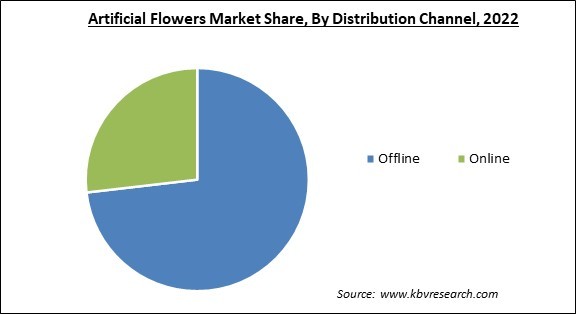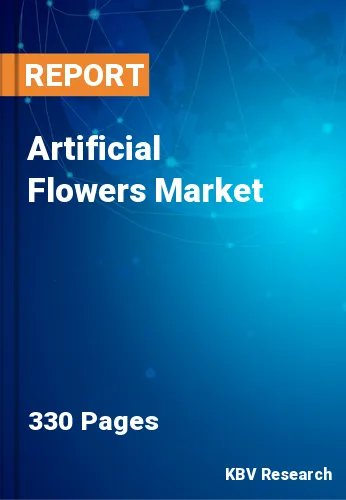The Global Artificial Flowers Market size is expected to reach $2.2 billion by 2030, rising at a market growth of 4.9% CAGR during the forecast period. In the year 2022, the market attained a volume of 546.1 million units, experiencing a growth of 3.7% (2019-2022).
Plastic artificial flowers are widely accessible and typically preferable due to their low price. Therefore, the Plastic segment generated $288.4 million revenue in the market in 2022. They are also in high demand due to their exceptional water resistance. Plastic is highly versatile and can be molded and shaped into a wide variety of flower shapes, sizes, and intricate details. They can withstand handling, transportation, and various environmental conditions without wilting, fading, or shedding petals. Some of the factors impacting the market are rising popularity of jewelry made from artificial flowers, growing demand for indoor and outdoor decorative products, and artificial flowers might increase pollution and environmental risks.

Young adults have recently become increasingly interested in artificial flower jewelry, available in various jewelry forms, such as artificial flower necklaces, brooches, and earrings. Many fashion and jewelry designers use artificial flowers to create jewelry with floral designs. Artificial flower jewelry provides a way to wear a piece of nature as an accessory. In some cultures, flowers hold symbolic significance. Artificial flower jewelry can reflect these cultural values and traditions. Therefore, the increasing popularity of artificial flower jewelry is a significant driver of growth in the market. There has been a noticeable rise in the number of interior and outdoor decorations found in homes and retail establishments. Artificial plants and flowers help to maintain appearance for longer periods and also improve the mood of the space in which they are installed. The demand for indoor and outdoor decorative products is shaped by a combination of lifestyle preferences, design trends, environmental awareness, functionality, and the desire to create visually appealing and comfortable spaces. These factors evolve over time, influencing the types of decorative products that consumers seek for their homes and outdoor areas. Thus, the aforementioned factors will propel the growth of the market in the coming years.
However, market development is hampered by rising consumer awareness of environmental protection, plastic pollution, and government laws regulating artificial flowers. Artificial plants and flowers can be harmful to individuals as well as the environment and are not biodegradable. Additionally, the government's present regulations are ordering a ban on the use of products made of plastic along with asking industries to lower their carbon footprint. Therefore, all of these elements may hamper the growth of the market in the coming years.
On the basis of application, the market is segmented into residential and commercial. The commercial segment procured the highest revenue share in the market in 2022. Increasing product adoption, most notably roses, tulips, and orchids, in commercial settings such as corporations, hotels, and shops, as well as their growing application for decorative and aesthetic purposes, support the growth of the commercial segment. The use of artificial flowers in commercial spaces can significantly enhance the ambiance, aesthetics, and overall experience for employees, clients, customers, and visitors. Flowers add a touch of nature, color, and freshness to these environments, contributing to a positive atmosphere.
By distribution channel, the market is categorized into online and offline. The offline segment held the largest revenue share in the market in 2022. Offline retail channels are the most popular sales platform in the market because of the simplicity of the product’s accessibility and availability. Artificial flowers can be found in a number of physical retail locations throughout the world, including specialty shops, supermarkets, and hypermarkets.

Based on material, the market is segmented into polyester, plastic, paper, silk, nylon, and others. The silk segment acquired a promising growth rate in the market in 2022. Silk has a soft and smooth texture that closely resembles the softness of real flower petals, adding to the authenticity of the artificial flowers. Silk flowers are often associated with elegance and sophistication, making them suitable for special occasions, events, and upscale decor.
| Report Attribute | Details |
|---|---|
| Market size value in 2022 | USD 1.5 Billion |
| Market size forecast in 2030 | USD 2.2 Billion |
| Base Year | 2022 |
| Historical Period | 2019 to 2021 |
| Forecast Period | 2023 to 2030 |
| Revenue Growth Rate | CAGR of 4.9% from 2023 to 2030 |
| Number of Pages | 330 |
| Number of Table | 710 |
| Report coverage | Market Trends, Revenue Estimation and Forecast, Segmentation Analysis, Regional and Country Breakdown, Companies Strategic Developments, Company Profiling |
| Segments covered | Material, Distribution Channel, Application, Region |
| Quantitative Data | Volume in Million units; revenue in USD Million, and CAGR from 2019 to 2030 |
| Country scope | US, Canada, Mexico, Germany, UK, France, Russia, Spain, Italy, China, Japan, India, South Korea, Singapore, Malaysia, Brazil, Argentina, UAE, Saudi Arabia, South Africa, Nigeria |
| Growth Drivers |
|
| Restraints |
|
Region-wise, the market is analyzed across North America, Europe, Asia Pacific, and LAMEA. The Europe segment held the highest revenue share in the market in the year 2022. Accelerating product adoption (for decorative and aesthetic purposes) in hotels, restaurants, and cafés benefits the regional market. Additionally, the expansion of the European hospitality industry drives artificial flowers demand. European segment participants prioritize mergers and acquisitions in order to acquire a competitive edge.
The market research report covers the analysis of key stake holders of the market. Key companies profiled in the report include FRS Holding s.r.l.u, Diane James Designs, Inc., Dongguan Fusheng Arts Products Co., Ltd., Artificial Flower Factory, TreeLocate (Europe) Limited, TreeScapes & PlantWorks, LLC, NGAR TAT PRODUCTION FTY. LTD., Plantscape Commercial Silk (PLANTSCAPE INC.), Xuzhou Pleasant Arts Flower Co., Ltd., and SG Silk Flower Limited
Free Valuable Insights: Global Artificial Flowers Market size to reach USD 2.2 Billion by 2030
By Application(Volume, Million Units, USD Million, 2019-2030)
By Material(Volume, Million Units, USD Million, 2019-2030)
By Distribution Channel(Volume, Million Units, USD Million, 2019-2030)
By Geography(Volume, Million Units, USD Million, 2019-2030)
This Market size is expected to reach $2.2 billion by 2030.
Rising popularity of jewelry made from artificial flowers are driving the Market in coming years, however, Artificial flowers might increase pollution and environmental risks restraints the growth of the Market.
FRS Holding s.r.l.u, Diane James Designs, Inc., Dongguan Fusheng Arts Products Co., Ltd., Artificial Flower Factory, TreeLocate (Europe) Limited, TreeScapes & PlantWorks, LLC, NGAR TAT PRODUCTION FTY. LTD., Plantscape Commercial Silk (PLANTSCAPE INC.), Xuzhou Pleasant Arts Flower Co., Ltd., and SG Silk Flower Limited
The expected CAGR of this Market is 4.9% from 2023 to 2030.
The Polyester segment is leading the Global Artificial Flowers Market by Material in 2022; thereby, achieving a market value of $843.5 Million by 2030.
The Europe region dominated the Global Artificial Flowers Market by Region in 2022, and would continue to be a dominant market till 2030; thereby, achieving a market value of $782.1 Million by 2030.
Our team of dedicated experts can provide you with attractive expansion opportunities for your business.

